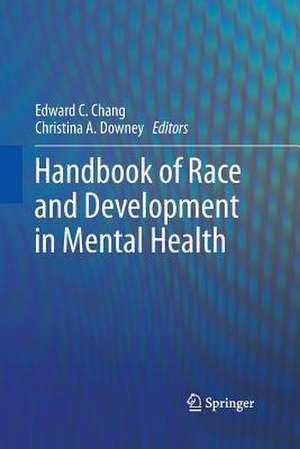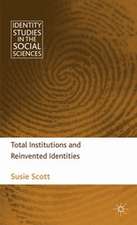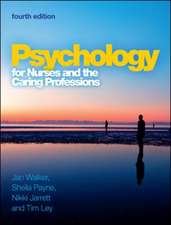Handbook of Race and Development in Mental Health
Editat de Edward Chang, Christina A. Downeyen Limba Engleză Paperback – 27 noi 2014
| Toate formatele și edițiile | Preț | Express |
|---|---|---|
| Paperback (1) | 1100.85 lei 43-57 zile | |
| Springer – 27 noi 2014 | 1100.85 lei 43-57 zile | |
| Hardback (1) | 1107.94 lei 43-57 zile | |
| Springer – 30 sep 2011 | 1107.94 lei 43-57 zile |
Preț: 1100.85 lei
Preț vechi: 1158.79 lei
-5% Nou
Puncte Express: 1651
Preț estimativ în valută:
210.64€ • 220.52$ • 174.30£
210.64€ • 220.52$ • 174.30£
Carte tipărită la comandă
Livrare economică 07-21 aprilie
Preluare comenzi: 021 569.72.76
Specificații
ISBN-13: 9781489993212
ISBN-10: 1489993215
Pagini: 416
Ilustrații: XXIV, 389 p.
Dimensiuni: 155 x 235 x 22 mm
Greutate: 0.58 kg
Ediția:2012
Editura: Springer
Colecția Springer
Locul publicării:New York, NY, United States
ISBN-10: 1489993215
Pagini: 416
Ilustrații: XXIV, 389 p.
Dimensiuni: 155 x 235 x 22 mm
Greutate: 0.58 kg
Ediția:2012
Editura: Springer
Colecția Springer
Locul publicării:New York, NY, United States
Public țintă
ResearchCuprins
Introduction.- Integrating Positive Psychology and Developmental Viewpoints into Cross-Cultural Mental Health.- II.- A Historical Perspective.- A History of Cross-Cultural Clinical Psychology, and its Importance to Mental Health Today.- III.- European Americans.- Psychology of Children.- Psychology of Adults.- Psychology of Elderly.- IV.- African Americans.- Psychology of Children.-Psychology of Adults.- Psychology of Elderly.- V.- Asian Americans.- Psychology of Children.- Psychology of Adults.- Psychology of Elderly.- VI.- Hispanic Americans.- Psychology of Children.- Psychology of Adults.- Psychology of Elderly.- VII.- Native Americans.- Psychology of Children.- Psychology of Adults.- Psychology of Elderly.- VIII.- Conclusion.- Emerging Trends and Future Challenges.
Recenzii
From the reviews:
“Using a positive psychology model, this book considers the five largest racial groups in the United States … across the lifespan. … The audience includes researchers, practitioners, and students in various disciplines in psychology … and social work. … Numerous figures and tables help clarify the text. Many of the chapters end with conclusions and future recommendations. … It is easy to read and gives practical ideas for intervention. … It will be a great addition to any clinician’s library.” (Gary B. Kaniuk, Doody’s Review Service, March, 2012)
“Handbook of Race and Development in Mental Health is novel in its comprehensive approach to positive psychology across race and life span … . Chang and Downey’s edited book is intended for clinicians, researchers, students, and other professionals in diverse fields … . The organization of the book makes it user-friendly for the intended audience. … All in all, Chang and Downey’s book encourages a much-needed shift from a one-size-fits-all notion of positive psychology to redefining mental health and psychological well-being within a cultural context.” (Sussie Eshun and Sangeetha Nayak, PsycCRITIQUES, Vol. 57 (29), July, 2012)
“Using a positive psychology model, this book considers the five largest racial groups in the United States … across the lifespan. … The audience includes researchers, practitioners, and students in various disciplines in psychology … and social work. … Numerous figures and tables help clarify the text. Many of the chapters end with conclusions and future recommendations. … It is easy to read and gives practical ideas for intervention. … It will be a great addition to any clinician’s library.” (Gary B. Kaniuk, Doody’s Review Service, March, 2012)
“Handbook of Race and Development in Mental Health is novel in its comprehensive approach to positive psychology across race and life span … . Chang and Downey’s edited book is intended for clinicians, researchers, students, and other professionals in diverse fields … . The organization of the book makes it user-friendly for the intended audience. … All in all, Chang and Downey’s book encourages a much-needed shift from a one-size-fits-all notion of positive psychology to redefining mental health and psychological well-being within a cultural context.” (Sussie Eshun and Sangeetha Nayak, PsycCRITIQUES, Vol. 57 (29), July, 2012)
Notă biografică
Edward C. Chang is Professor of Clinical Psychology and a Faculty Associate in Asian/Pacific Islander American Studies at the University of Michigan, Ann Arbor. He received his B.A. in psychology and philosophy from the State University of New York at Buffalo, and his M.A. and Ph.D. degrees from the State University of New York at Stony Brook. Dr. Chang completed his APA-accredited clinical internship at Bellevue Hospital Center-New York University Medical Center. He serves as a program evaluator for the Michigan Department of Community Health – Social Determinants of Health, working with the Asian Center Southeast Michigan. Dr. Chang also serves as an Associate Editor of Cognitive Therapy and Research, the Asian American Journal of Psychology, and the Journal of Personality and Social Psychology. He has published more than a hundred empirical and scholarly works focusing on optimism and pessimism, perfectionism, loneliness, social problem solving, and cultural influences on behavior. Dr. Chang is the editor of Optimism and Pessimism: Implications for Theory, Research, and Practice (2001), Self-Criticism and Self-Enhancement: Theory, Research, and Clinical Implications (2007), and Handbook of Adult Psychopathology In Asians: Diagnosis, Etiology, and Treatment (forthcoming), and is a co-editor of Virtue, Vice, and Personality: The Complexity of Behavior (2003), Social Problem Solving: Theory, Research, and Training (2004), and Judgments Over Time: The Interplay of Thoughts, Feelings, and Behaviors (2006).
Christina A. Downey is an Assistant Professor of Psychology at Indiana University Kokomo. She received her B.A. in Psychology from Purdue University, and her M.A. and Ph.D. degrees in clinical psychology from the University of Michigan, Ann Arbor. Her dissertation work focused on lay theories of health among community adults. Her research interests include mixed-method study of lay theories of health, understanding the relations between perfectionism and disturbed eating behaviors, college student attitudes about various aspects of diversity, and the outcomes of including service learning in college pedagogy. She has published articles in Cognitive Therapy and Research and Eating Behaviors, and has co-authored chapters in Social Problem Solving: Theory, Research, and Training (Chang, D’Zurilla, & Sanna, 2004) and Judgments Over Time: The Interplay of Thoughts, Feelings, and Behaviors (Sanna & Chang, 2006). Her next chapter, on multicultural considerations in positive psychology (co-authored with Dr. Chang) will appear in the upcoming APA Handbook of Multicultural Psychology. She also maintains a strong commitment to excellent college teaching, and has presented on the value of incorporating service learning in the teaching of research methods in psychology.
Christina A. Downey is an Assistant Professor of Psychology at Indiana University Kokomo. She received her B.A. in Psychology from Purdue University, and her M.A. and Ph.D. degrees in clinical psychology from the University of Michigan, Ann Arbor. Her dissertation work focused on lay theories of health among community adults. Her research interests include mixed-method study of lay theories of health, understanding the relations between perfectionism and disturbed eating behaviors, college student attitudes about various aspects of diversity, and the outcomes of including service learning in college pedagogy. She has published articles in Cognitive Therapy and Research and Eating Behaviors, and has co-authored chapters in Social Problem Solving: Theory, Research, and Training (Chang, D’Zurilla, & Sanna, 2004) and Judgments Over Time: The Interplay of Thoughts, Feelings, and Behaviors (Sanna & Chang, 2006). Her next chapter, on multicultural considerations in positive psychology (co-authored with Dr. Chang) will appear in the upcoming APA Handbook of Multicultural Psychology. She also maintains a strong commitment to excellent college teaching, and has presented on the value of incorporating service learning in the teaching of research methods in psychology.
Textul de pe ultima copertă
Handbook of Race and Development in Mental Health
Edward C. Chang and Christina A. Downey, editors
The early decades of psychology were concerned with pathology: its causes, identification, and treatment. Eventually this foundation expanded to include positive aspects of human behavior, such as intelligence, creativity, and love. But even as positive psychology grew insignificance, it was limited on two fronts—its universalism, ignoring the role of cultural differences, and its focus on young adults, marginalizing the very real experiences of children and elders.
The Handbook of Race and Development in Mental Health addresses both shortcomings with knowledge and accessibility. For each of the major racial groups in the United States,chapters explore risk and protective factors in children, social support systems, challenges of inequality, the roles of culture and context in coping,prevalent psychological conditions, barriers to help-seeking, aging-related issues, and other key areas. This cultural/lifespan approach offers enlightening points of comparison and contrast, particularly for the clinical or counseling practitioner.
A sampling of the topics included in the Handbook:
Rich with both findings and possibilities, the Handbook of Race and Development in Mental Health offers researchers, practitioners,and students in various disciplines in psychology (such as clinical,cross-cultural, community, developmental, and positive), social work, and counseling a deeper understanding of all their clients, both as members of their communities and as individuals.
Edward C. Chang and Christina A. Downey, editors
The early decades of psychology were concerned with pathology: its causes, identification, and treatment. Eventually this foundation expanded to include positive aspects of human behavior, such as intelligence, creativity, and love. But even as positive psychology grew insignificance, it was limited on two fronts—its universalism, ignoring the role of cultural differences, and its focus on young adults, marginalizing the very real experiences of children and elders.
The Handbook of Race and Development in Mental Health addresses both shortcomings with knowledge and accessibility. For each of the major racial groups in the United States,chapters explore risk and protective factors in children, social support systems, challenges of inequality, the roles of culture and context in coping,prevalent psychological conditions, barriers to help-seeking, aging-related issues, and other key areas. This cultural/lifespan approach offers enlightening points of comparison and contrast, particularly for the clinical or counseling practitioner.
A sampling of the topics included in the Handbook:
- African Americans: effects of parenting styles on children; coping strategies and John Henryism in adults.
- Native Americans/Alaska Natives: intergenerational trauma; spiritual practice and well-being.
- Asian Americans: the “model minority” stereotype; peer support and wellness.
- European Americans: why children may be underrepresented in the literature.
- Latinos: bilingualism; biculturalism; acculturative stress.
- Guidelines for incorporating lifespan and positive psychology into multicultural competence.
Rich with both findings and possibilities, the Handbook of Race and Development in Mental Health offers researchers, practitioners,and students in various disciplines in psychology (such as clinical,cross-cultural, community, developmental, and positive), social work, and counseling a deeper understanding of all their clients, both as members of their communities and as individuals.
Caracteristici
Consistent chapter organization allows for easy comparison of cultural groups
Integrates a lifespan perspective into structure
Emphasis on Positive Psychology approach
Includes supplementary material: sn.pub/extras
Integrates a lifespan perspective into structure
Emphasis on Positive Psychology approach
Includes supplementary material: sn.pub/extras













